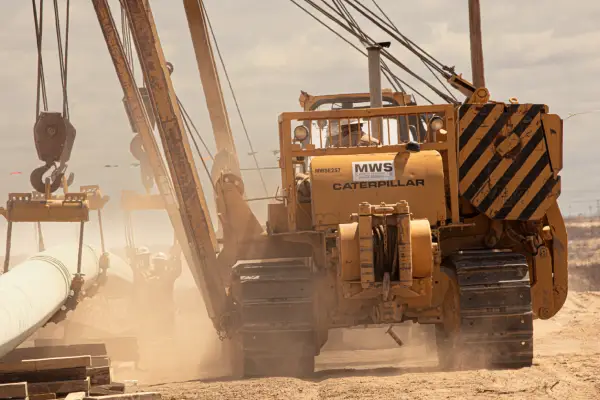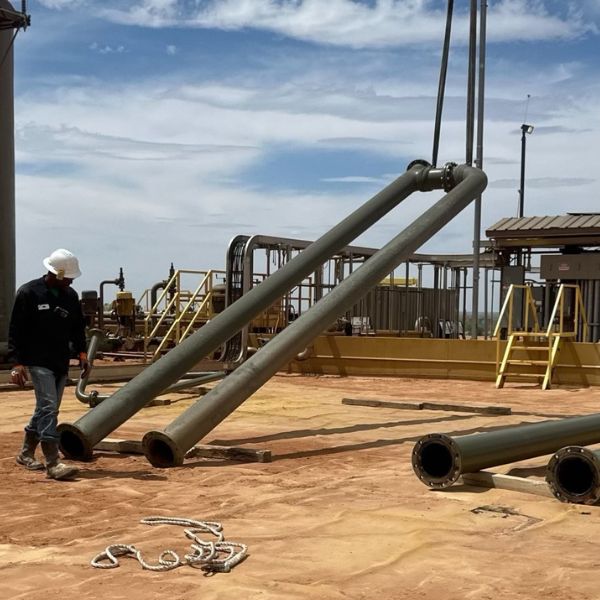7 Questions to Ask Before Contracting Pipeline Construction Services
Wiki Article
The Necessary Overview to Understanding Pipeline Construction Services and Their Relevance
Pipeline Construction solutions are basic to the transport of essential resources such as water, oil, and gas. These solutions involve thorough preparation and implementation, sticking to stringent safety and environmental requirements. As the market adapts to modern obstacles, understanding its elements and effects ends up being significantly essential. What factors add to the growing relevance of these services in today's economy? The following areas will explore these essential elements.Summary of Pipeline Construction Services
Pipeline Construction solutions include a variety of activities essential for the installment and maintenance of pipelines used to carry different substances, consisting of gas, water, and oil. These solutions are essential for assuring the secure and efficient activity of sources from one location to another. The procedure commonly starts with thorough planning and design, which takes right into account regulatory needs, ecological considerations, and logistical challenges.Excavation and grading of the land are performed to prepare the site for Pipeline setup when planning is full. This is followed by the actual laying of the pipes, which involves welding or signing up with areas together to create a continual flow path. After setup, extensive testing is executed to ensure integrity and safety and security. Upkeep services are likewise offered to attend to any type of issues that may arise gradually. In general, Pipeline Construction solutions play a crucial role in supporting infrastructure for power and water circulation.
Key Components of Pipeline Construction
A successful Pipeline Construction project counts on several essential elements that ensure the effective and secure installation of the Pipeline system. Extensive site analyses are vital, as they identify the geographical and ecological factors that might impact Construction. Next, the option of appropriate materials, such as pipelines and installations, is vital for securing durability and compatibility with the carried substances.Progressed Construction methods, including trenchless modern technology and directional drilling, enhance performance and minimize environmental influence. Reliable job monitoring is an additional crucial component, collaborating labor, tools, and timelines to fulfill task goals.
In addition, communication amongst stakeholders, consisting of designers, professionals, and regional authorities, assurances alignment on project requirements and requirements. Thorough high quality control procedures throughout the Construction procedure ensure compliance with market requirements and make best use of the Pipeline's operational life-span. Jointly, these elements form the backbone of an effective Pipeline Construction task.
Safety And Security Specifications and Rules in Pipeline Construction

Boosting Regulatory bodies, such as the Occupational Safety and Health Management (OSHA) and the Pipeline and Hazardous Products Safety Management (PHMSA), set forth details requirements that regulate Construction methods. These consist of protocols for equipment usage, employee training, and emergency situation reaction treatments. By applying these requirements, Construction companies not only shield their employees but also protected public trust. Eventually, extensive safety and security measures add to the long-term success of Pipeline projects, guaranteeing they satisfy both environmental and functional assumptions.
Ecological Factors To Consider in Pipeline Projects

Ecological considerations are indispensable to the preparation and implementation of Pipeline tasks. These jobs have to analyze potential influence on ecosystems, water resources, and neighborhood wildlife. Performing complete environmental effect analyses (EIAs) is essential, permitting stakeholders to identify and reduce dangers prior to Construction begins.
Safeguarding sensitive locations, such as marshes and environments, frequently calls for applying specific style features or alternative transmitting to minimize disruption. In addition, Pipeline drivers are tasked with developing methods for stopping leaks and spills, which can have destructive effects on the setting.
Interaction with regional areas is important, as public issues can result in task modifications that boost environmental defense. Conformity with regulations set by ecological agencies assures that tasks meet sustainability requirements, fostering a balance between infrastructure demands and eco-friendly conservation. Inevitably, addressing ecological factors to consider not only safeguards nature however also promotes neighborhood trust and job viability.
The Duty of Technology in Pipeline Construction
Technology plays a crucial role in modern-day Pipeline Construction, boosting efficiency and accuracy. Advanced checking methods enable accurate planning and implementation, decreasing environmental effect and project delays. In addition, the assimilation of automation and robotics enhances operations, decreasing labor prices and enhancing security on Construction sites.Advanced Evaluating Methods
Advanced evaluating strategies play an essential duty in the successful execution of Pipeline Construction projects. These approaches utilize advanced modern technology to guarantee precise mapping and evaluation of the surface where pipelines will be installed. Strategies such as Geographic Info Solution (GIS), LiDAR (Light Detection and Ranging), and 3D modeling enable designers to picture and evaluate the landscape, identifying potential obstacles and environmental concerns. By making use of these advanced tools, groups can enhance precision in positioning and placement, considerably minimizing the threat of errors during Construction. Additionally, real-time information collection enables for immediate adjustments and notified decision-making throughout the task lifecycle. Ultimately, these evaluating advancements add to boosted performance, safety, and sustainability in Pipeline Construction efforts.Automation and Robotics

Economic Effect of Pipeline Facilities
Pipeline facilities plays a crucial function in promoting and forming local economic situations profession. Recommended Reading By providing a trustworthy ways of transporting oil, gas, and various other assets, pipelines decrease transport costs and boost supply chain effectiveness. This facilities brings in investment, boosts task creation, and cultivates financial development in bordering locations.The Construction and upkeep of pipelines add substantially to local economic situations, creating numerous employment opportunities in numerous industries, from design to labor. The influx of jobs commonly causes enhanced investing in neighborhood organizations, even more bolstering economic activity.
Additionally, pipelines boost energy safety by making sure a steady supply of sources, which is essential for property requirements and commercial procedures. As areas become interconnected through Pipeline networks, they access to wider markets, enhancing competitiveness and economic resilience. Consequently, the financial influence of Pipeline framework is diverse, influencing both prompt neighborhood economic situations and wider regional advancement.
Future Patterns in Pipeline Construction Providers
The future of Pipeline Construction solutions is progressing in feedback to technological innovations, regulative adjustments, and growing ecological considerations. Technologies such as robotics and drones are improving examination and upkeep processes, improving safety and security and efficiency. Automation is poised to lower labor prices and enhance precision in Construction procedures. In addition, the enhancing emphasis on sustainability is triggering firms to take on environmentally friendly materials and techniques, lining up with global initiatives to minimize carbon footprints.Regulative frameworks are also adjusting to address environmental influences, pressing for better openness and responsibility in Pipeline tasks. The assimilation of wise modern technologies, consisting of real-time tracking systems, is anticipated to improve the integrity and performance of Pipeline networks. As energy demands shift toward eco-friendly sources, Pipeline Construction services will likely see an increase in projects associated with biofuels and hydrogen transportation. Overall, these patterns indicate a transformative period for the Pipeline Construction industry, concentrated on advancement and sustainability.
Regularly Asked Concerns
What Kinds of Pipelines Are Frequently Constructed?
Different kinds of pipelines are commonly created, consisting of oil, gas, sewage, and water pipelines - Pipeline Construction Services. Each serves distinctive functions, helping with the transportation of crucial resources throughout regions while adhering to safety and security and environmental guidelinesHow much time Does a Common Pipeline Project Take?
The duration of a common Pipeline job differs substantially, typically ranging from numerous months to a couple of years. Variables influencing this timeline consist of job complexity, regulative approvals, and ecological factors to consider that have to be resolved.That Controls Pipeline Construction Companies?
Pipeline Construction companies are controlled by various federal, state, and local agencies, including the Pipeline and Hazardous Materials Safety And Security Management (PHMSA) and state public energy payments, making certain compliance with security and ecological standards throughout the Construction procedure.What Are Typical Products Utilized in Pipeline Construction?
Usual materials utilized in Pipeline Construction consist of polyethylene, pvc, and steel. Each material offers unique advantages such as resistance, adaptability, and resilience to corrosion, making them appropriate for different applications in transporting liquids and gases.
Exactly How Are Pipeline Construction Expenses Approximated?
Pipeline Construction expenses are approximated by examining elements such as product expenses, labor prices, job intricacy, environmental considerations, and regulatory needs (Pipeline Construction Services). Precise price estimation warranties effective budgeting and task planning throughout the Construction processPipeline Construction solutions include official statement a range of tasks necessary for the installation and maintenance of pipelines used to move different materials, consisting of water, oil, and gas. A successful Pipeline Construction task relies on several essential elements that ensure the safe and effective installment of the Pipeline system. Advanced surveying techniques play a necessary function in the effective implementation of Pipeline Construction projects. Various kinds of pipes are generally created, including oil, water, gas, and sewage pipelines. Pipeline Construction expenses are estimated by analyzing factors such as material expenses, labor prices, task intricacy, ecological factors to consider, link and governing demands.
Report this wiki page